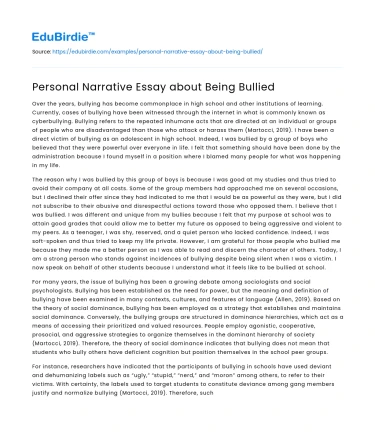Over the years, bullying has become commonplace in high school and other institutions of learning. Currently, cases of bullying have been witnessed through the internet in what is commonly known as cyberbullying. Bullying refers to the repeated inhumane acts that are directed at an individual or groups of people who are disadvantaged than those who attack or harass them (Martocci, 2019). I have been a direct victim of bullying as an adolescent in high school. Indeed, I was bullied by a group of boys who believed that they were powerful over everyone in life. I felt that something should have been done by the administration because I found myself in a position where I blamed many people for what was happening in my life.
The reason why I was bullied by this group of boys is because I was good at my studies and thus tried to avoid their company at all costs. Some of the group members had approached me on several occasions, but I declined their offer since they had indicated to me that I would be as powerful as they were, but I did not subscribe to their abusive and disrespectful actions toward those who opposed them. I believe that I was bullied. I was different and unique from my bullies because I felt that my purpose at school was to attain good grades that could allow me to better my future as opposed to being aggressive and violent to my peers. As a teenager, I was shy, reserved, and a quiet person who lacked confidence. Indeed, I was soft-spoken and thus tried to keep my life private. However, I am grateful for those people who bullied me because they made me a better person as I was able to read and discern the character of others. Today, I am a strong person who stands against incidences of bullying despite being silent when I was a victim. I now speak on behalf of other students because I understand what it feels like to be bullied at school.
Save your time!
We can take care of your essay
- Proper editing and formatting
- Free revision, title page, and bibliography
- Flexible prices and money-back guarantee
For many years, the issue of bullying has been a growing debate among sociologists and social psychologists. Bullying has been established as the need for power, but the meaning and definition of bullying have been examined in many contexts, cultures, and features of language (Allen, 2019). Based on the theory of social dominance, bullying has been employed as a strategy that establishes and maintains social dominance. Conversely, the bullying groups are structured in dominance hierarchies, which act as a means of accessing their prioritized and valued resources. People employ agonistic, cooperative, prosocial, and aggressive strategies to organize themselves in the dominant hierarchy of society (Martocci, 2019). Therefore, the theory of social dominance indicates that bullying does not mean that students who bully others have deficient cognition but position themselves in the school peer groups.
For instance, researchers have indicated that the participants of bullying in schools have used deviant and dehumanizing labels such as “ugly,” “stupid,” “nerd,” and “moron” among others, to refer to their victims. With certainty, the labels used to target students to constitute deviance among gang members justify and normalize bullying (Martocci, 2019). Therefore, such interactions and meaning-making patterns established in bullying are normally understood by sociologists as labeling and stigma processes.
It is demonstrated that when bullies are labeled as being deviant, they are established as people who violate crucial social norms and values of society. Moreover, stigma has been argued by social psychologists and sociologists as vital in understanding the effects of labeling. The discourse of bullying has created social prospects that have trapped the victims who have become bullying-made labels (Allen, 2019). On the other, students who do not participate in bullying have tended to avoid the victims because they fear societal contamination and peer pressure. The incidence of bullying that happened in my life made me establish the victims as people who are excluded and rejected from the social life of the school. I believe that students who are socially isolated are often caught in the victim cycle that they cannot easily escape because of the different social construction.






 Stuck on your essay?
Stuck on your essay?

